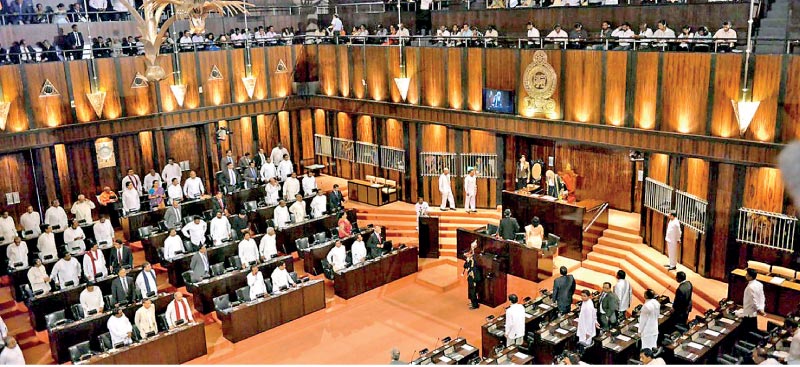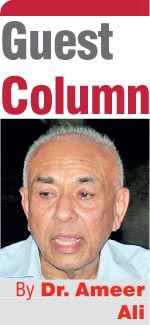Thursday Feb 19, 2026
Thursday Feb 19, 2026
Monday, 21 October 2024 00:00 - - {{hitsCtrl.values.hits}}

A supportive parliament with two-third majority for NPP is an absolute must for the new regime to translate its promises into action
 AKD expects his JVP-led NPP to win a majority of seats in the legislature to make his task easier. The question is whether that majority should be a simple working majority or a solid two-third majority. Disastrous consequences under governments that ruled with two-third majority in the past had provoked political pundits and opinion makers to question the wisdom of electing governments with two-third majority. Without questioning their wisdom however, a special case could be argued in favour of such a majority to the regime (the terminology is employed neutrally) headed by President AKD.
AKD expects his JVP-led NPP to win a majority of seats in the legislature to make his task easier. The question is whether that majority should be a simple working majority or a solid two-third majority. Disastrous consequences under governments that ruled with two-third majority in the past had provoked political pundits and opinion makers to question the wisdom of electing governments with two-third majority. Without questioning their wisdom however, a special case could be argued in favour of such a majority to the regime (the terminology is employed neutrally) headed by President AKD.
AKD’s Presidency and his NPP coalition government would be ushering in under very challenging circumstances. A shattered economy under IMF stewardship struggling to resume growth, an ethnonationalist but corrupt, clannish and nepotistic system of governance with an associated political culture which not only sapped the vitality of that economy but also deepened the ethnic and social fissures in Sri Lanka’s plural polity, and the persistent pressures from rivalling regional and global powers to exert their respective influence in the island’s foreign relations are no ordinary challenges to manage while exploring the avenues of economic growth and development with an indigenous trademark. This is no easy task especially for a President and his cabinet of ministers many of whom were schooled in an ideology radically different from the ones which previously influenced the think tanks of previous governments.
Politically awakened men and women
Yet, ideology is one thing but translating it into practice is quite another. Radicalism was indeed the bread and butter of many a political party in the Cold War era of previous century. That radicalism has either disappeared completely or been mellowed by pragmatism so much to lose their original identity. As a result, the post-Cold War era has produced a new generation of politically awakened men and women who want to enjoy the fruits of democratic freedom while striving to achieve economic prosperity without sacrificing their national identity. President AKD and his NPP coalition are the products of that generation in Sri Lanka.
The 2022 Aragalaya was the open expression of that generation and the demand for system change epitomised its yearning for democracy with economic justice. AKD and his coalition was born out of that Aragalaya and they did undertake to translate that yearning to reality. Change of political culture and governance through social revolution became their declared mantra to achieve economic growth with equity. That itself demonstrates a revolutionary transformation to a political group whose origins were bloodied with insurrections and military massacres. The Aragalaya wave was so stormy and strong that within a short period of time it left its footprint on the political landscape of this country.
President AKD’s victory not through bullets but through ballots marked the beginning of Aragalaya’s peaceful march towards a radical transformation of politics in the history of post-independence Sri Lanka. It is an experiment undertaken by a new generation of voters and that generation should carry the full credit if the experiment succeeds and it alone should take the responsibility if it fails. A supportive parliament with two-third majority for NPP is therefore an absolute must for the new regime to translate its promises into action.
Intergenerational transfer of political leadership
The fact that around 50 politicians from the old order are said to have withdrawn from contesting this time is silent testimony to the intergenerational transfer of political leadership in this country. If the 2021 Polikandy to Pottuvil march organised by the Tamil youth and the 2022 Aragalaya led by Sinhala youth were of any indication they demonstrated a growing desire within the new generation for inclusiveness, justice and change to a different economic paradigm. On both occasions, youth from all ethnic and religious communities joined in and all they wanted was change from a divisive, undemocratic and unjust ethnocracy to an inclusive, democratic and just pluralist polity. AKD’s campaign to clean up the political culture and governance covers only one half of the task ahead. The other half rests almost entirely in the economic sphere.
IMF stewardship in steering the nation’s economic recovery has drawn bitter criticism from certain quarters. Knowing the disastrous record of IMF in countries like Argentina and in Africa that criticism is not out of place. But the point is whether the citizenry is prepared to face the consequences of getting rid of the IMF. Pragmatism dictates that the present rulers continue negotiating with it for a more favourable outcome, and there are factors outside economics that could make it possible.
One of the reasons why the economy went down the precipice was because of bad and incompetent governance. IMF itself pointed out this in one of its periodical reviews. AKD and his team have started already to rectify this. Yet, there is no guarantee that the new experiment will be faultless. After all Rome was not built in a day, but the new leadership should be given the benefit of the learning curve.
(The writer can be reached at Business School, Murdoch University, W. Australia.)